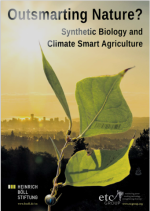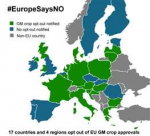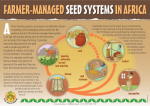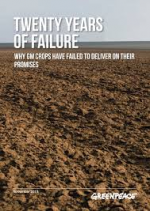30.11.2015 | permalink
GM Bt cotton seeds performing poorly
Production of strategic cotton crop falling alarmingly
The genetically modified ‘Bt’ cotton seed, introduced in Pakistan a decade ago to increase its vital cash crop to over 20 million bales by 2015, has done the opposite.
Agriculture experts and researchers report that this year’s production is four million bales short of the targeted 15 million bales. “Cotton production has declined continuously since 2005,” according to a Pakistan Agriculture Research Council (PARC) official.
(.....)
As some had warned, after two years of trials conducted by the multinational Biotech seed producing company, Monsanto, in different parts of the country, the imported Bt varieties failed to perform in the local environment.
And the exorbitant and unaffordable royalty demanded by Monsanto for technology transfer became an extra burden.
- GMWatch: Pakistan: Cotton production declined since introduction of GM Bt cotton
- Rediff.com Business: Bt cotton turns out to be a disaster for Indian farmers
- Greenpeace International: Genetically Engineered (GE) Cotton Fails to Perform in Colombia
- GeneWatch UK: Pest resistant crops - Pest resistant crops (Bt crops) produce toxins which kill insect pests. Bt maize is grown largely for use in animal feed and biofuels in North and South America. Bt cotton is also grown in India and China.
- Canadian Biotechnology Action Network - CBAN: Genetically Modified Cotton, CBAN Factsheet / Cotton
30.11.2015 | permalink
Precision farming should only be small part of holistic EU agriculture
Only sustainable practices, with prevention coming first, will be able to feed the world, writes Henriette Christensen.
Henriette Christensen is senior policy advisor at PAN Europe, an anti-pesticides NGO.
PAN Europe has read EurActiv's special report Europe entering the era of precision farming and believes it is time to define what this term actually covers, and where it is useful.
While we fully recognise that there are aspects of precision farming which are useful (like weather forecasts and pest simulation programs), we are completely opposed to the argument that precision farming is the key to ensuring sustainability of agricultural production.
Modern technologies, covering smart phones and internet-linked programs, allow farmers to integrate weather forecasts and pest simulation programs the in every-day life of a farm, that were not available only a decade ago. Other such technologies are modern equipment like satellite navigation tools, GPSs etc., which help farmers to target spray better. Some even argue that with tools like GMOs, seed treatment may also be considered precision farming.
29.11.2015 | permalink
Report Release: Outsmarting Nature?

New Report Questions Risky Synthetic Biology Developments Promoted Under “Climate-Smart” Guise
Paris, 27th November 2015 – Some of the world’s largest agro-industrial corporations will be flying the flag for ‘climate-smart agriculture’ at the upcoming Climate Summit. They will claim that hi-tech crops and intensive industrial agriculture are needed to rescue farmers (and the hungry) from a warming world – a claim widely dismissed by peasant movements and civil society groups. A new report today from ETC Group and Heinrich Böll Foundation uncovers plans to use a clutch of extreme biotechnology approaches known as Synthetic Biology to move forward this industrial ‘climate-smart’ agenda. Extreme interventions range from trying to alter the way in which plants carry out photosynthesis to releasing ‘gene drives’ into the wild to alter natural populations of weeds.
28.11.2015 | permalink
Earth To Paris: The Organic Movement Calls for an End to High-emitting Industrial Farming Practices
Industrialized farming costs $3.33 trillion per year in environmental damage. We can remedy this by switching to agro-ecological farming practices such as organic agriculture. With the world awaiting an agreement from the upcoming COP21 climate conference in Paris, the organic food and farming movement calls for commitment to land-based mitigation measures that contribute to food security and tackle the root causes of climate change.
Producing the food we eat from farm to fork accounts for about half of all human-induced greenhouse gas emissions. When it comes to greenhouse gas (GHG) emissions, the agricultural sector is second only to the energy sector. To date climate negotiators and policy-makers have paid little attention to this fact. IFOAM - Organics International calls for a climate agreement recognizing the importance of the land sector and the start of a process developing clear and transparent principles to ensure actions taken on climate change are in accordance with social and ecological considerations. “Industrial farming is one of the major drivers of climate change, and business as usual is not an option, “ states André Leu, President of IFOAM - Organics International. “Only a transition to agroecology and organic farming can lead to deep cuts in emissions from food production”.
27.11.2015 | permalink
Séralini’s team and CRIIGEN win two court cases about their research on toxicity of GMOs and pesticides
On 25 November 2015, the High Court of Paris indicted Marc Fellous, former chairman of France’s Biomolecular Engineering Commission, for “forgery" and “the use of forgery”, in a libel trial that he lost to Prof Gilles-Eric Séralini. The Biomolecular Engineering Commission has authorised many GM crops for consumption.
The details of the case have not yet been publicly released but a source close to the case told GMWatch that Fellous had used or copied the signature of a scientist without his agreement to argue that Séralini and his co-researchers were wrong in their reassessment of Monsanto studies.
The Séralini team’s re-assessment reported finding signs of toxicity in the raw data from Monsanto’s own rat feeding studies with GM maize.
The sentence against Fellous has not yet been passed and is expected in June 2016.
- GMWatch: Séralini’s team and CRIIGEN win two court cases about their research on toxicity of GMOs and pesticides
- CRIIGEN, Comité de Recherche et d'Information Indépendantes sur le génie Génétique: Victoire du Pr Séralini, de son équipe et du CRIIGEN dans deux procès !!
- ENSSER: Democratising Science & Decision Making
17.11.2015 | permalink
GeneWatch UK and TestBiotech PR: Warning to EU Member States not to allow new genetically engineered soybeans with resistance to glyphosate for import

Recent assessment of EFSA supports concerns regarding health risks
On 18 November, the Standing Committee on Plants, Animals, Food and Feed has three applications for the import authorisation of genetically engineered soybeans with resistance to glyphosate on its agenda. These soybeans can be used as food and feed across the EU. Two of these plants have been engineered to be resistant to the combined use of other herbicides and glyphosate. Testbiotech and GeneWatch UK are together requesting that these authorisation processes are suspended.
Their concerns are supported by a recent conclusion of the European Food Safety Authority (EFSA) on the health risk assessment of glyphosate: In its assessment, EFSA concludes that there is no evidence for the carcinogenicity of the active ingredient glyphosate. But this conclusion explicitly does not include the applications of glyphosate on genetically engineered soybeans or the application of commercial mixtures of glyphosate such as Roundup that contain various additives.
12.11.2015 | permalink
Easy to read seed posters for smallholder farmers and civil society

The African Centre for Biodiversity (ACB) is pleased to share 10 easy to read posters on intellectual property rights in relation to seed and what these mean for smallholder farmers. These posters come at a time where there is pressure on African governments to adopt new stringent intellectual property laws, namely, Plant Variety Protection (PVP) on seed. These new PVP laws give strong rights to breeders while undermining farmers' rights and seed sovereignty. Most farmers and civil society organisations have been locked out of the process of developing these PVP laws, while others are keen to learn more about what these laws entail.
The posters have been produced in various languages and are available for download in English, French, Swahili, Shona, IsiZulu, Sotho, and Portuguese.
They are available on a range of topics including: Farmers Rights and the Seed Treaty; What is Plant Variety Protection (PVP) and protected varieties?; Seed sovereignty for farmers; Women as custodians of seed; Plant Breeders' Rights; Farmers' Rights and UPOV 1991; Farmer-managed seed systems; Seed from the commercial sector; Monsanto's theft of Turkey's purple carrot; Sui generis laws for PVP/PBR protection; and ARIPO: harmonisation of Plant Variety Protection in Africa.
The posters are written in plain language and have been illustrated. They are therefore, simple and easy to read and represent a good source of information to share with farmers. The posters will be particularly useful in assisting in training workshops, farmer field schools, farmer to farmer trainings and other farmer and civil society fora in order to share knowledge and information with and between farmers.
To download the posters please click on this link:
http://www.acbio.org.za/lists/lt.php?id=Yh8GB1dIU1FICQgAAA
05.11.2015 | permalink
Twenty Years of Failure Why GM crops have failed to deliver on their promises

Twenty years ago, the first genetically modified (GM) crops were planted in the USA, alongside dazzling promises about this new technology. Two decades on, the promises are getting bigger and bigger, but GM crops are not delivering any of them. Not only was this technology supposed to make food and agriculture systems simpler, safer and more efficient, but GM crops are increasingly being touted as the key to 'feeding the world' and 'fighting climate change'.
16.10.2015 | permalink
Pressure mounts against GMOs as Kenya celebrates World Food Day

Nakuru, 15th October, 2015: This World Food Day, all roads lead to the magnificent Nakuru County in Kenya’s rift valley region; where a demonstration and a public debate have been organised to challenge the push for the introduction of Genetically Modified Organisms (GMOs) in Kenya.
The Kenya Biodiversity Coalition (KBioC) together with Greenpeace Africa, Kenya Organic Agriculture Network (KOAN) and the Institute for Culture and Ecology (ICE) are joining the rest of the world to celebrate and address critical issues and concerns around the Right to food. Through the demonstration, the organisations aim to call on the Government of Kenya (GOK) not to lift the ban on GMOs. The demonstration will be followed by a public forum which will debate whether Nakuru is ready for GMOs.
- Greenpeace Africa: Pressure mounts against GMOs as Kenya celebrates World Food Day
- Greenpeace International: 5 ways to celebrate World Food Day (and fix our broken food system)
- Friends of the Earth: October 16 is World Food Day
- FAO: Food and Agriculture Organization of the United Nations
- The Huffington Post: On World Food Day, Look At Amazing Photos Of Soil Around The World
15.10.2015 | permalink
Syngenta withdraws two GM crops - Vilmorin, KWS license Syngenta GMO corn traits
Greenpeace Press release - October 12, 2015
Brussels – Agrochemical company Syngenta has withdrawn two out of four of its GM maizes awaiting EU approval [1], following widespread rejection of GM crop cultivation by two thirds of EU governments. According to the European Commission, on 8 October, Syngenta withdrew pesticide-producing MIR 604 and pesticide-producing and herbicide-resistant Bt11xMIR604xGA21. Two other Syngenta GM maizes have not been withdrawn and are still pending approval. They are herbicide-resistant GA21 and pesticide-producing and herbicide-resistant Bt11.
---
Vilmorin, KWS license Syngenta GMO corn traits
Oct 15 French seed group Vilmorin and German peer KWS SAAT signed long-term licensing agreements with Syngenta to use the Swiss chemical group's genetically modified (GMO) corn traits, they said on Thursday. They will be allowed to market Syngenta's current and future corn (maize) traits on a separate basis or through their joint ventures AgReliant, which sells seeds in North America, and Genective, which aims to develop its own GMO corn traits. Syngenta will receive a $200 million upfront payment and future royalty and milestone payments pending regulatory approvals.



